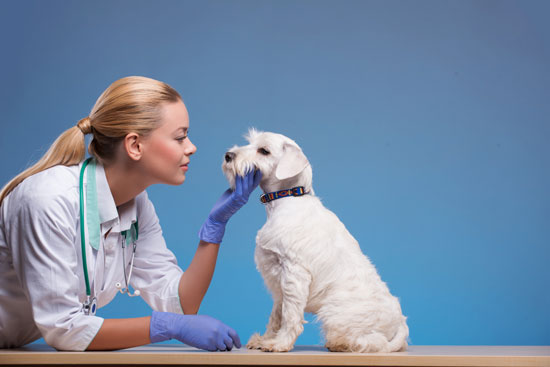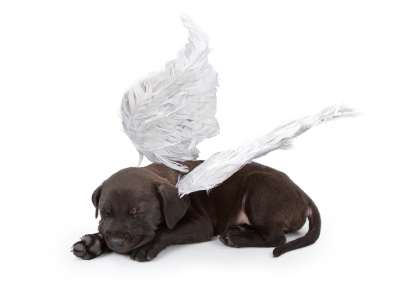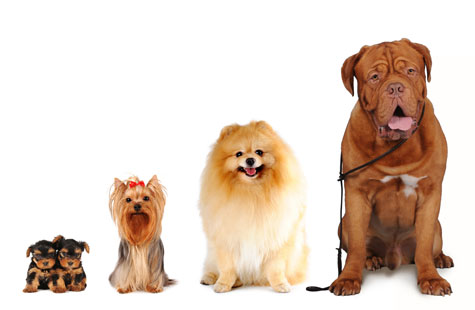Why Having a Little Dog Rocks
Posted by Hot Dog Collars on 12/17/15 12:59 PM
 Fifty years ago, most of the popular dog breeds in the U.S. were large ones. People had large homes and open, uncrowded streets outside, where their dogs could run around. They saw the size of their pets as a symbol of their status too, much as they did their cars. When people's careers and lifestyle choices began to take them to crowded, urban environments, though, things began to change. Even if dog owners could find apartments that welcomed large dogs, they couldn't fit them there, or even find space outside to exercise them.
Fifty years ago, most of the popular dog breeds in the U.S. were large ones. People had large homes and open, uncrowded streets outside, where their dogs could run around. They saw the size of their pets as a symbol of their status too, much as they did their cars. When people's careers and lifestyle choices began to take them to crowded, urban environments, though, things began to change. Even if dog owners could find apartments that welcomed large dogs, they couldn't fit them there, or even find space outside to exercise them.
It isn't Paris Hilton's fault
Mintel, the market research organization, estimated in a recent pet ownership survey that 52 percent of dog owners in America owned miniature dogs (see: store.mintel.com/americas-pet-owners-us-september-2011?cookie_test=true). If you're horrified at this shift in dog ownership tastes, you might be inclined to blame it on celebrities such as Paris Hilton, Britney Spears, Alec Baldwin and Scarlett Johansson. They all seem to want to outdo one another in finding the tiniest dogs possible to flaunt on the red carpet. They seem to influence the general public too.
In truth, though, the switch to handbag-sized dogs isn't just about celebrities. It is also about switching to low-maintenance lifestyles. People today are too busy to tend to large, high-maintenance dogs. Even when they do have time, some people just do not have the energy needed. About one-fifth of the population today is of retirement age.
If you're in the process of acquiring a new dog, you should seriously consider putting a few tiny pups on your shortlist. The arguments in favor of petite pooches can make a lot of sense.
Small dogs live longer
In general, the larger the animal, the longer it lives. While mice only live a couple of years, elephants live to 75. Within most species, though, things change. Whether it's horses or humans, smaller individuals live much longer.
The pattern is especially clear among dogs. Great Danes, mastiffs and other massive dogs tend to live no longer than seven years. Miniature poodles, on the other hand, easily reach 15 years of age. Researchers have found that large breeds simply age faster (see: livescience.com/27676-why-small-pups-outlive-large-dogs.html). For anyone who doesn't want to go through the heartbreak of losing a dog twice as often, a small dog can truly rock.

Miniature mutts tend to be healthier
Many small breeds do far more than just live longer; they are rarely sick too. Chihuahuas, poodles, Bichon Frises, Shiba Inus and Basenjis are among the healthiest of all dog breeds (Basenjis don't even bark). Not only will you spend more time playing with these dogs than taking them to the vet, you'll save thousands in healthcare costs too.
Small mutts are easy to travel with
Large dogs may have been a great choice at a time when people mostly lived in their hometowns and rarely traveled. Today, when people move to new cities for their careers all the time, they need to make sure their choice of pet doesn't lock them out of the rental market. Big dogs are almost never welcome at rentals.
If you love to travel, you'll find that owning a large pet locks you out of the travel market as well. It can be hard to find airlines willing to fly large pets, or hotels willing to accommodate them. Big dogs also tend to be harder to keep healthy on the road -- they have more exacting demands for exercise and food. A small dog sets you free.
You'll be more social with a tiny pooch
You certainly will attract interested looks and offers of conversation when you walk a fine, big dog. In general, though, people tend to be wary of large animals. Small dogs, on the other hand, enjoy a great reputation for being friendly, even if they sometimes don't deserve it. When you walk a small dog, you'll have far more people approaching you, hoping for a chance to pet your dog and tell you how cute it is. You'll find yourself making friends all the time.
Small dogs end up smelling less
Taking care of a large animal can be hard work. Everything from bathing to grooming can be a chore when you have a powerful, protesting animal to handle. In contrast, to the average-sized person, a toy dog can be so easy to take care of. The results can be a cleaner dog overall. You'll find yourself bathing your dog more often, brushing its teeth, cleaning its ears, and a lot more. You end up with a much more pleasant-smelling pet.

They are less dangerous to your family
Labradors and Greyhounds may be large and powerful dogs, but they are two of the least aggressive animals around, and the safest to have around children. When large dogs do decide to bite, though, they can do great damage in seconds. Small breeds are simply less capable of damage. If you get a Bichon Havanese, Chihuahua, poodle or other friendly breed, you'll have the safest pet for your family -- they couldn't do much harm even if they wanted to.
Who would believe that poodles are among the most intelligent of dogs?
While you don't get to see many police poodles today, the breed has been used for hunting, tracking and herding for centuries. Among dogs, poodles are rated right alongside German shepherds for high intelligence. Empty-headed, poodles are not.
 Large breeds of dog are beautiful, and a great deal of fun to have around. Modern lifestyles are changing, though, and large dogs aren't the best way to go for many people. The shift toward small dogs is no fad. It falls right into place alongside smaller homes and smaller cars. Whether your choice is a small or large dog, or somehwere in between, we have you covered. Come check out our "Shop By Breed" section here for a wide range of products made specifically for your breed
Large breeds of dog are beautiful, and a great deal of fun to have around. Modern lifestyles are changing, though, and large dogs aren't the best way to go for many people. The shift toward small dogs is no fad. It falls right into place alongside smaller homes and smaller cars. Whether your choice is a small or large dog, or somehwere in between, we have you covered. Come check out our "Shop By Breed" section here for a wide range of products made specifically for your breed

